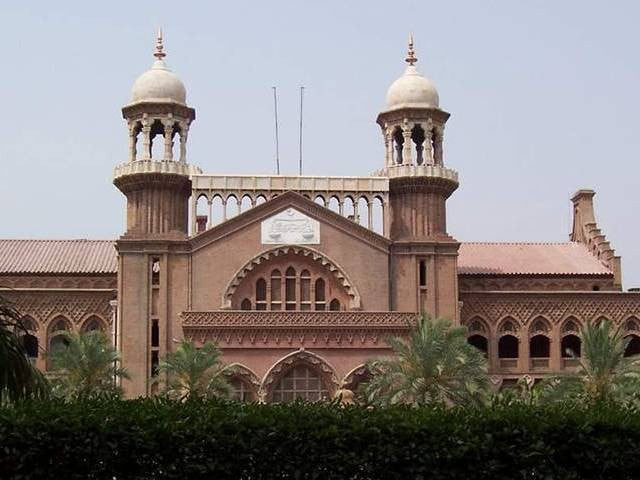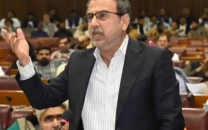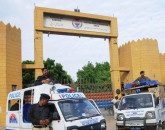LHC reserves decision on PTI's plea against ECP appointments
ECP’s counsel requests court to dismiss this plea as non-maintainable

The Lahore High Court(LHC) on Tuesday reserved a decision on a plea by Pakistan Tehreek-e-Insaf (PTI) challenging the appointment procedure of the officials from bureaucracy for general election duties.
Petitioner barrister Umair Khan Niazi, PTI’s additional secretary general and focal person on legal affairs to former chairman Imran Khan and the PTI, had challenged appointments of district returning officers (DROs), returning officers (ROs) and assistant returning officers (AROs), claiming that general elections could not be conducted transparently, fairly and freely in the presence of these officers from the branch of State.
The court, presided by Justice Ali Baqar Najafi, was requested that the Election Commission of Pakistan (ECP) be directed to initiate a consultation process with LHC’s chief justice for the appointment of judicial officers as DROs and ROs under Sections 50 and 51 of the Elections Act 2017 for the polls in 2024.
It was further prayed to the court to restrain the ECP, during the pendency of this plea, from appointing these officers from the executive authorities of the government.
Today, Justice Najafi after hearing detailed arguments reserved the decision, while the law officer strongly opposed the contentions of the petitioner’s counsel, requesting the court to dismiss the petition.
ECP’s counsel further requested the court to dismiss this plea as non-maintainable.
The judiciary was also requested for the judicial officers but then it was denied, the counsel contended to the court.
On the other hand, the petitioner’s counsel implored the court that although the announcement of the elections has resuscitated the hope of survival of democracy and democratic values in Pakistan, it is difficult to gloss over the fact that the general elections 2024 will be held beyond the constitutionally mandated period.
It was further stated the national mood, regarding the much-anticipated elections, is of scepticism and is refraining from jubilation and maintained that these elections will be held amidst the worst crackdown in our national history on the civil liberties and constitutional protections of the citizens of Pakistan.
Barrister Niazi implored the court that PTI, the largest and most popular party in Pakistan, has been a victim of discrimination as well as deliberated schemes of the caretaker governments in both the federal and province to suppress the democratic and nationalist spirit of PTI and its supporters.
He further contended that in Punjab, the caretaker Chief Minister Mohsin Naqvi has influenced the bureaucracy against PTI, its leaders and political workers as well as the official orders/statements issued on social media adding that bias and the will to eliminate the party from the political landscape of Punjab has been clearly demonstrated.
Read ECP appoints ROs, DROs for 859 constituencies
The counsel further claimed that the federal government has treated the party with equal heavy-handedness.
“Ever since the regime change and more particularly the appointment of caretaker governments in Punjab and the federation, PTI has been at the receiving end of the worst form of political victimization and persecution and that too is state-sponsored. The caretaker governments have grossly abused the executive power to prosecute and arrest to engineer the political landscape of the country,” the lawyer protested.
“There is a concerted attempt to annihilate the PTI as a political party”, he argued.
Barrister Niazi further said that the large-scale operations against PTI in the last few months have resulted in the arrests of hundreds of political workers associated with PTI including women and senior citizens in successive frivolous criminal cases.
“The caretaker governments have made frequent transfer postings in the bureaucracy. The Elections Act 2017 places an express restriction on the transfer-postings of the officers but the governments have recklessly disregarded this statutory test”, he remarked and added that Sections 50(1)(b) and 51 (1) of the Elections Act 2017 stipulate that the Election Commission shall appoint DROs, ROs by the selection from the government officers in violation of Article 218 (3) of the Constitution which is liable to be declared unconstitutional.
He argued that it is a matter of record that bureaucracy is susceptible to executive interference by the government, and lacks functional autonomy and institutional security of tenure in terms of postings as well as transfers. “The provisions in the Elections Act mandating the appointment of executive officers as DROs and Ros amount to sanctioning executive interference by the government in the electoral process rendering the same to be violative of Article 218 (3) of the Constitution and liable to be struck down,” he protested.
“As the list of executive officers for appointment is to be provided by the government essence the government has a direct and far more important role in the appointment of DROs”, he maintained.
He reiterated that this renders the impugned Section 50(1)(b) of Elections Act 2017 to the extent of the expression “list of offices provided by the government or a provincial government” is liable to be struck down for violating Article 220 read with Article 218 of the Constitution.
The petitioner’s counsel then requested the court that Sections 50 (1)(b) and 50 (1) of the Elections Act 2017 be declared unconstitutional.
Alternatively, it was prayed that section 50(1)(b) of the Elections Act 2017 to the extent of the expression “list of officers provided by the government or a provincial government” therein may kindly be declared unconstitutional.


















COMMENTS
Comments are moderated and generally will be posted if they are on-topic and not abusive.
For more information, please see our Comments FAQ